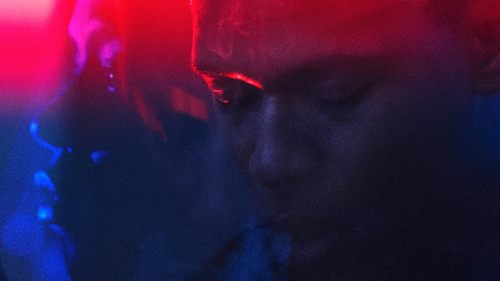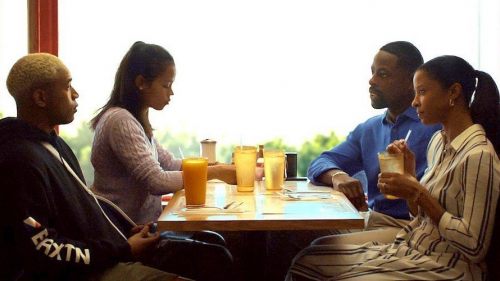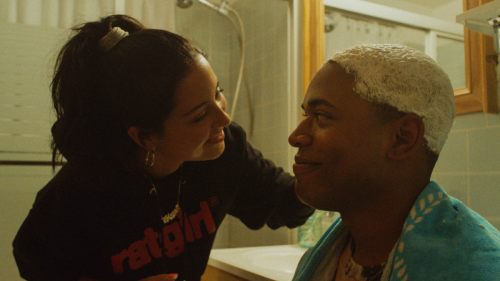The Overlook Film Festival Review: IT COMES AT NIGHT
It Comes at Night makes a lot of sense as a follow-up to Trey Edward Shults’ fascinating, micro-budget debut Krisha. Both are claustrophobic portraits of family and domesticity. Both feel personal and somehow dangerous. Both are remarkable films.
But where Krisha is a family drama with undercurrents of horror, It Comes at Night is an outright horror film, a nightmare of paranoia and mistrust. It’s much bigger in scope and scale, while never losing the almost painful intimacy of Krisha.
Some time after an unnamed plague has wiped out much of the population – enough time that our characters are well within the habit of surviving without electricity or running water – a family lives in a remote home nestled in the woods. Paul (Joel Edgerton) is a former teacher turned pioneer man, because that’s what he had to do to survive, and to protect his wife Sarah (Carmen Ejogo) and seventeen-year-old son Travis (Kelvin Harrison Jr). Their life is small and quiet, but not peaceful, exactly. There’s a lot of love there, and they have a routine that makes sense to them: only travel outside in pairs, in gas masks and never at night, eat together twice a day, the only entrance and exit to the house is the red door and there is only the one set of keys.
But running underneath the calm of this unchanging procedure, behind everything they do and each decision they make, there’s a coursing river of fear. They have been untouched by the plague only by grace and good fortune, but they’ve seen what it does to its victims – what it did to Travis’ grandfather. They will never be free, because they’ll never be safe.
It’s into these treacherous waters that Christopher Abbott’s Will arrives, searching for food and water for his own wife Kim (Riley Keough) and much younger son Andrew (Griffin Robert Faulkner). It takes a lot of convincing, but Paul finally decides to take them in. For a while, the two families peacefully coexist, and we’re treated to scenes of their almost-happy home life, an idyllic little montage of Chinese checkers, of laughter and hard, honest work. But beneath it all, that river of fear is always running, and the relentless paranoia proves to be a more invasive illness than the plague that inspires it.
It Comes at Night is such a visually powerful film, tight and oppressive, tinged with darkness in even the most innocuous scenes. A massive, upturned tree reaches its dark roots out to us while Will cheerfully teaches Travis the proper way to chop wood. That obstinate red door looms in the background as the families chatter and go about their days. During the Q&A, Shults said he and cinematographer Drew Daniels (returning after Krisha) relied on practical lighting, lamps and lanterns, during the nighttime scenes. “If we’re going to make a movie called It Comes at Night, I want to feel the night,” he said, and we do feel it, heavy and unremitting, as much of a character as Travis.
Harrison is outstanding as Travis, often the silent observer of the household, wide-eyed and achingly sweet. We want so much more for Travis, but we know in the opening seconds of the film that there is no happily ever after here. We’ve come into a world well after it’s moved on, and Travis is in the prime of his life when the earth's own prime has long passed.
Edgerton is also credited as an executive producer on the film, and was instrumental in getting it made. He is, of course, so great, this stalwart presence that strengthens everyone around him. Abbott, Keough, Ejogo – they’re all excellent here, everyone playing with different levels of small hopes eclipsed by pervasive dread, near-friendships that are drowning in distrust.
A24 brought It Comes at Night as the secret screening of The Overlook Film Festival, and we were told beforehand that the film isn’t entirely finished, with some small visual effects to be finalized, but it certainly feels complete. It’s devastating, an unblinking gaze at the cost of our collective fear of death, our own and that of those we love, asking what that fear does to us, what it takes from us when we're yet alive. It’s a sense-provoking, full-bodied experience that caused an entire audience to exhale heavily the moment the screen turned black. And it’s an assurance that Shults is a filmmaker who must be followed.



